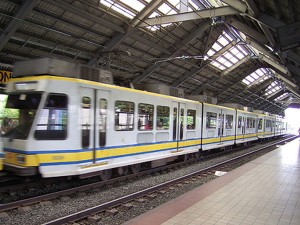Big Chinese firm eyes LRT 1 extension project

The project extending the LRT Line 1 to Cavite province makes a forward stride with the publication Monday, June 4, 2012, of the invitation to interested parties to prequalify to bid for the P30-billion contract.
Despite territorial tensions between Beijing and Manila, China Railway Construction Corp. (CRCC), China’s second-biggest state-owned construction company, has signified its interest in taking on the Light Trail Transit (LRT) South Extension project to be bid out this year.
But instead of participating in the bidding process for the project, the Chinese company’s partner, Reghis Romero II-led Ecorail Transport Services Inc., has proposed a joint venture with the government.
Should its proposal be accepted, Ecorail said it would bring to the Philippines the same cutting-edge, affordable train technology that has allowed China’s own railway system to prosper.
The Department of Transportation and Communications (DoTC) last week published its invitation for interested parties to “prequalify” to bid for the P30-billion project—currently the most expensive contract on the state’s auction block.
Ecorail executive vice president Jerome Canlas said CRCC had sent a letter signifying its willingness to pursue the project, which it first explored in 2009.
Article continues after this advertisement“We hereby affirm our interest to cooperate with your esteemed organization to jointly pursue the above project, which not only further underscores our mutual long-term relationship but also progression of the framework of cooperation agreement entered into by both our organizations in Tianjin in June 2009,” CRCC vice president Hu Zhenyi said in the letter to Ecorail.
Article continues after this advertisementThe LRT South Extension will lengthen the current Baclaran-to-Roosevelt line, known as “Line 1,” to Imus, Cavite, passing through Parañaque and Las Piñas cities. The winning contractor will also be tasked to operate the entire Line 1 from Cavite to Quezon City.
The government’s plan is to split the project in half, with the private sector funding and handling the civil works costing P30 billion and the government acquiring the new trains and electromechanical systems for another P30 billion. But Ecorail said it would submit a proposal to take on the entire project on its own since it had more than enough cash for it.
“Ecorail [will] fully provide the financial requirements of the project without government subsidy unlike other propositions seeking overseas development assistance (ODA) from multilateral and bilateral funding agencies that require counterpart funds from the Philippine government,” Canlas said.
Despite giving the government access to cheap capital, the main disadvantage of ODA funding for taxpayers is the usual limitation on the participation of Filipino contractors as subcontractors, in favor of foreign contractors from sponsor countries.
Under its proposed joint venture, the government’s only part would be to provide the land to be used for the project. In return, the government would get a share in fare revenues.
Canlas said the Ecorail-CRCC partnership would complete the project in 36 months, much faster than the government’s own projection of completing it in close to four years.
CRCC is one of the biggest construction companies in the world with assets of more than $1 trillion. CRCC has already built 34,000 kilometers of railway tracks all over the world.